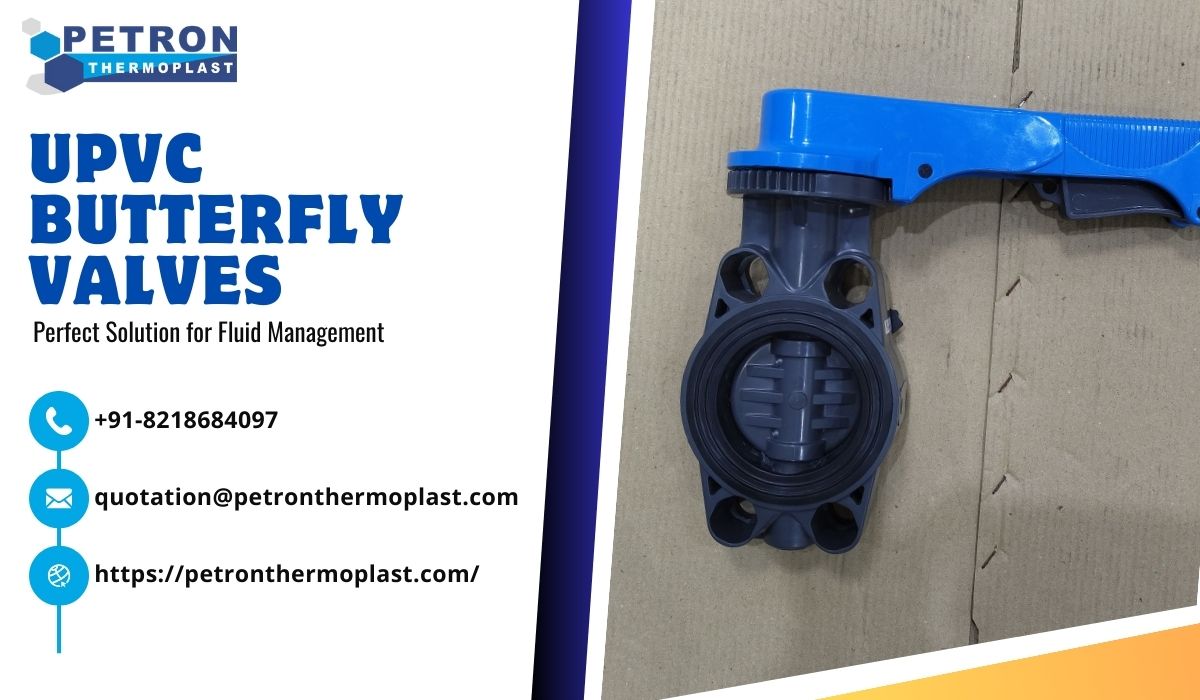UPVC Butterfly Valves – Perfect Solution for Fluid Management
In the realm of fluid management, selecting the right valve is critical for ensuring smooth, efficient, and reliable operation. Among the many types of valves available, UPVC butterfly valves have gained significant attention due to their versatility, durability, and cost-effectiveness. These valves are designed to provide precise flow control and are widely used across industries such as water treatment, chemical processing, irrigation, and more. In this blog, we will explore why UPVC butterfly valves are the perfect solution for fluid management, their benefits, applications, and key considerations for selection.
UPVC Butterfly Valves – Stock Available for Instant Delivery
| Item Name | Item Code |
| FK BUTT.FLY DIN-ANSI D63 PPH EPDM BARE SHAFT | FKOMFM063E |
| FK BUTT.FLY DIN-ANSI D90 PPH EPDM | FKOMLM090E |
| VKD BALL ISO SPIGOT D63 PPH EPDM | VKDDM063E |
| FE BUTT.FLY DIN-ANSI D140 PVCU EPDM | FEOVLM140E |
| FE BUTT.FLY DIN-ANSI D75 PVCU EPDM | FEOVLM075E |
What Are UPVC Butterfly Valves?
UPVC (Unplasticized Polyvinyl Chloride) butterfly valves are a type of quarter-turn valve that uses a rotating disc to control the flow of fluids. The UPVC material is a rigid, durable thermoplastic known for its excellent chemical resistance, lightweight nature, and low cost. The valve’s simple design and functionality make it an ideal choice for a wide range of fluid management applications.
Advantages of UPVC Butterfly Valves
UPVC butterfly valves offer several advantages that make them a preferred choice for fluid control systems:
- Chemical Resistance UPVC butterfly valves exhibit exceptional resistance to a broad range of chemicals, including acids, bases, and salts. This makes them ideal for applications in chemical processing plants and water treatment facilities.
- Lightweight and Easy to Handle The lightweight nature of UPVC material simplifies installation and maintenance, reducing labor costs and time.
- Cost-Effective Compared to valves made from metals or other advanced materials, UPVC butterfly valves are more affordable without compromising performance.
- Corrosion Resistance Unlike metal valves, UPVC butterfly valves do not corrode, making them suitable for environments where exposure to moisture and corrosive substances is common.
- Low Maintenance These valves require minimal maintenance due to their robust design and resistance to wear and tear.
- Energy Efficiency The smooth interior surface of UPVC valves minimizes friction, reducing pressure drops and enhancing energy efficiency in fluid systems.
- Wide Range of Sizes and Configurations UPVC butterfly valves are available in various sizes, pressure ratings, and configurations to meet diverse operational needs.
Key Applications of UPVC Butterfly Valves
The versatility and performance of UPVC butterfly valves make them suitable for a wide range of applications. Here are some of the most common uses:
1. Water Treatment Plants
UPVC butterfly valves are extensively used in water treatment facilities for controlling water flow, especially in applications involving potable water, wastewater, and desalination processes.
2. Chemical Processing
Their excellent chemical resistance makes these valves a reliable choice for handling aggressive chemicals in chemical manufacturing and processing industries.
3. Irrigation Systems
In agricultural irrigation systems, UPVC butterfly valves play a critical role in managing water distribution effectively and efficiently.
4. Swimming Pools
These valves are commonly used in swimming pool systems to regulate water flow and manage chemical dosing.
5. Food and Beverage Industry
UPVC butterfly valves are suitable for applications in the food and beverage industry where hygienic and non-corrosive components are essential.
6. HVAC Systems
Heating, ventilation, and air conditioning systems use these valves for controlling the flow of cooling and heating fluids.
Design and Working Principle
The design of a UPVC butterfly valve is simple yet effective. It consists of:
- Body: The main structure made of UPVC that houses the internal components.
- Disc: A circular component that rotates to control the flow. The disc is positioned perpendicular to the flow when the valve is closed and parallel when open.
- Stem: Connects the disc to the actuator or handle, enabling the rotation of the disc.
- Seat: Provides a seal to prevent leaks when the valve is closed.
The working principle involves a quarter-turn operation where the disc rotates around its axis. In the open position, the disc aligns with the flow direction, allowing fluid to pass. In the closed position, the disc is perpendicular to the flow, blocking it completely.
Factors to Consider When Choosing a UPVC Butterfly Valve
Selecting the right UPVC butterfly valve for your application requires careful consideration of several factors:
- Operating Conditions
- Consider the pressure and temperature range of the system.
- Ensure the valve material and design can handle these conditions.
- Chemical Compatibility
- Verify that the UPVC material is compatible with the fluids being handled.
- Size and Configuration
- Choose a valve size that matches the pipeline diameter and flow requirements.
- Select the appropriate connection type (wafer, lug, or flanged).
- Actuation Mechanism
- Decide between manual, electric, or pneumatic actuation based on the system’s needs.
- Quality and Standards
- Ensure the valve meets relevant industry standards for safety and performance, such as ISO or ANSI.
- Maintenance Requirements
- Opt for valves that are easy to maintain and have a long service life.
Why Choose Petron Thermoplast for UPVC Butterfly Valves?
At Petron Thermoplast, we pride ourselves on being a trusted supplier of high-quality UPVC butterfly valves. Our valves are engineered to deliver optimal performance, durability, and efficiency in fluid management systems. Here’s what sets us apart:
- Extensive Range We offer a comprehensive selection of UPVC butterfly valves in various sizes and configurations to meet diverse application needs.
- Quality Assurance Every valve undergoes rigorous quality checks to ensure compliance with international standards.
- Custom Solutions Our team provides tailored solutions to meet unique customer requirements, ensuring the best fit for your system.
- Expert Support With years of experience in the industry, our experts provide guidance on valve selection, installation, and maintenance.
- Timely Delivery We understand the importance of meeting project timelines and ensure prompt delivery of our products.
Conclusion
UPVC butterfly valves have proven to be a perfect solution for fluid management in various industries. Their chemical resistance, lightweight design, and cost-effectiveness make them a practical choice for applications ranging from water treatment to chemical processing. By choosing a trusted supplier like Petron Thermoplast, you can ensure access to high-quality valves that meet your operational requirements and deliver long-lasting performance. Whether you’re upgrading your existing system or designing a new one, UPVC butterfly valves are a reliable and efficient choice for managing fluid flow.














Post Comment